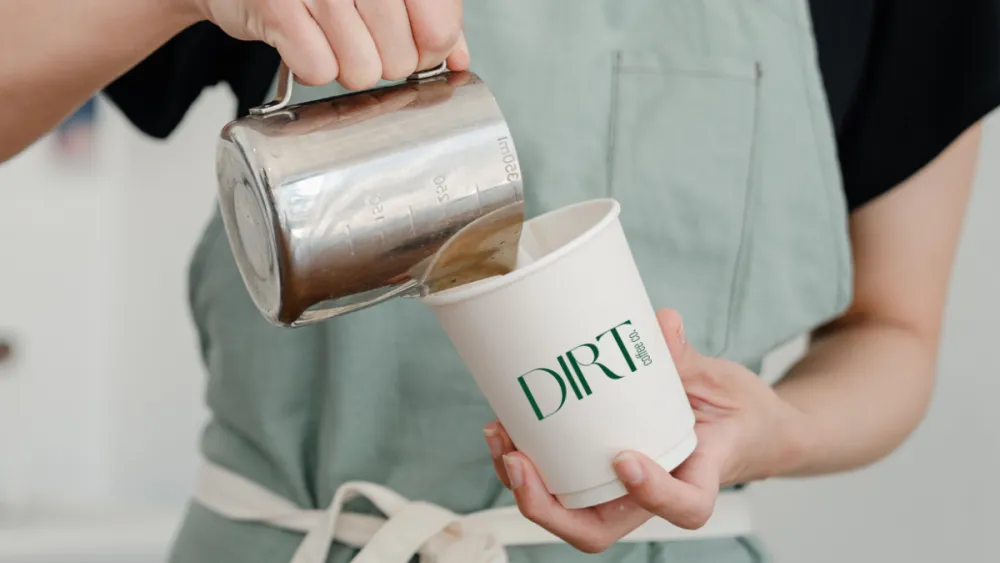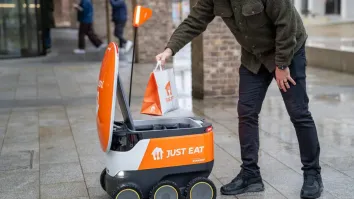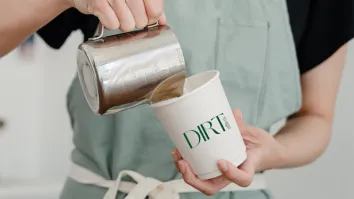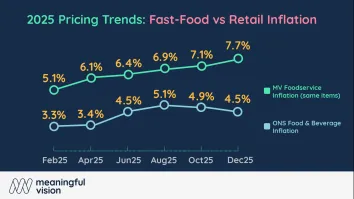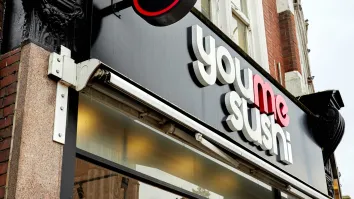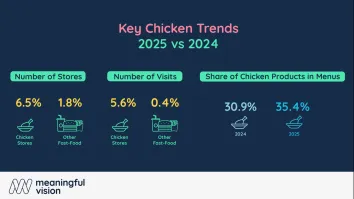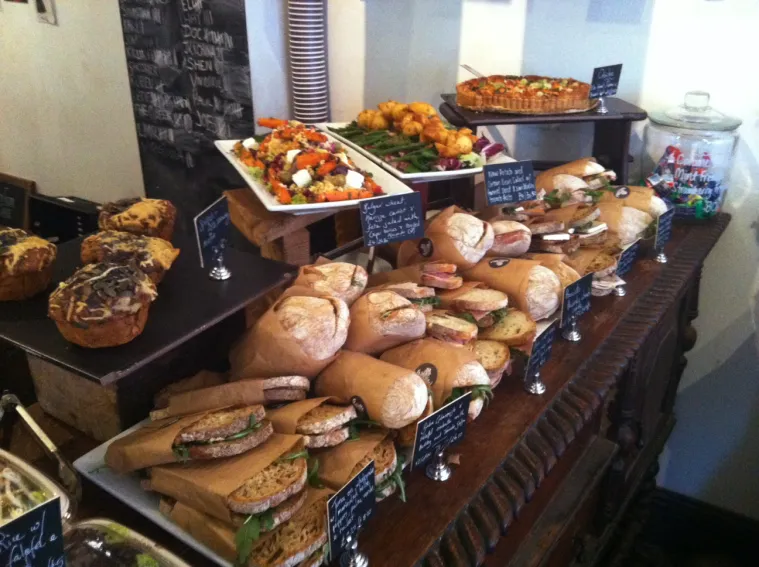
EXCLUSIVE: How Crowdcube is Shaking Up the World of Finance and What it Means for Growing QSRs
Following Taylor St Baristas recent mini bond launch, we spoke with Crowdcube CMO and Co-Founder Luke Lang to find out more about the financing tool displacing banks, and what it means for growing QSRs.
QSR: Tell us more about crowdcube. What do you do? How does it differ from other forms of finance?
The idea behind crowdcube came out of a frustration with the difficulties and challenges entrepreneurs had in raising finance. Angel investing at the time we set up was broken with fewer investors and those that remained being more reticent to invest. The whole system was also limiting and elitist. You had to be wealthy and well connected to be able to back British businesses. In addition banks weren't lending like they used to, and government grants were few and far between, and being slashed. There was a lot of pressure on entrepreneurs and how they could finance the early growth stages of their business- and that was the problem that we wanted to solve.
We also wanted to make investing more accessible and affordable for the ordinary person. We knew normal people wanted the opportunity to back British businesses and that's what we do- open up a whole new source of capital for businesses by connecting the two groups.
We launched in 2011 and at the time we were the first equity crowd funding platform in the world. In the early days we were having to create a new market, raise awareness to try and get budding entrepreneurs to put their business idea online, and to get people to invest through a platform.
It is evident to me that there is a strong passion and appetite for people to invest and back businesses that they know, like and adore and hopefully deliver a good return on investment at the same time.
QSR: What forms of financing do you offer?
Originally it was about equity investment, taking the concept of crowdfunding, such as a Kickstarter, and evolving it to where investors are taking equity and a real stake in a business. We ran equity raisings for 3 years and it wasn’t until last June we launched our first debt product- the mini bond. 3 of the 4 companies we have done mini bonds for have been food and drink related. We did a mini bond for Chilango (the Mexican chain), who raised just over £2 mill, River Cottage, who were looking to expand their chain of restaurants, and most recently Taylor Street Baristas. We are in talks with businesses from a range of different sectors, including some familiar household names, so a growing array of businesses are releasing the potential of our mini-bond as a way of raising finance.
QSR: In debt space, what do rates compare at vs banks?
Terms are more favourable. Some of the banks are charging very high interest rates but it is also the flexibility whereby a company can define what the interest repayment is. They can build in extra value to investors like free burritos, free coffees etc. These are all tangible benefits that can have a value add to the investor without a huge cost to the company. If you went to a bank they wouldn’t accept burritos or coffees as forms of repayment. So it gives a form of flexibility. Not having personal guarantees is also important. A lot of banks look for personal guarantees on business loans.
QSR: Why did you move into debt finance?
We decided to move into debt because we knew our investors were keen on moving into this area. The businesses that raise debt finance tend to be much better known and well established vs the typical equity raising customers. They offer proven concepts, and are cash flow generating. This is important because these businesses need to be able to service the interest payments.
There is a lot more work we do with companies looking to raise debt too. We look at the company's financial position, forecast their financials, do scenario analyses etc. Of course there are risks, and it is 'investor beware' but we have a very thorough due diligence process in place for our debt raising and equity raisings. We also have a team of analysts from different backgrounds that work on our mini bonds.
QSR: How does your process work from a business’ point of view?
The process is similar be it debt or equity. All clients have an initial conversation with a member of the business development team who’ll get to know them- essentially doing an initial suitability check. That can happen relatively quickly- perhaps on a call or a few meetings to determine if the idea is right for crowd funding. If it's a start-up we'll be looking at what the company has achieved, what the idea is, if the valuations are appropriate for their stage of business, if there is an appetite from investors, if the business is scalable, if there a history of running businesses in the past etc- all the sorts of things our investors would be looking for when investing into a business.
The next stage is the due diligence phase. We’ll start to look in greater depth at the business and make sure that any statements they make are fair, clear and not misleading, so factual in other words. We look into their financial position, make sure that from a legal standpoint the business is in a good position to raise funding. The due diligence phase is also about helping to get the business to create and build their investment pitch.
With a mini-bond, we also try to understand the history of the company, how its been trading to date, what its growth aspirations are, what the funds will be used for, whether it be opening new stores or investing in marketing. We seek to understand the numbers and the trends of the specific business, its profit, its sensitivity to fluctuations in demand. We take the business through a very detailed process of getting to know them and doing the due diligence on the company before they go live. We help prepare them for the listing. We talk to them about what they should be doing before the pitch goes live- how they should be promoting the business, and what they should be doing to push the message out for their fund raising.
Once due diligence is complete we'll put the pitch live on our platform.
QSR: How long does the whole process take?
The due diligence phase timeframe will depend on how well prepared the company is. We’ve been able to turn some deals around in a few days to a few weeks. But on average equity investment takes 2-4 weeks and on the mini bond side it can take 1-2 months to prepare everything. But if all the information is ready to go we can turn things around quickly.
Once they're live, 60 days is the standard time for raising investment. Though some businesses have funded in a matter of hours (The Eden Project funded in 20 hours). Others go on to take the full 60 days. Our average time to fund is around 30 days.
Length of time to fund will depend on the size of the client's customer database- the larger the database the quicker the time to fund. We have 125,000 registered investors ourselves all looking for the next investment opportunity, so it is a combination of clients marketing the pitch to their community of customers and suppliers themselves, in tandem with us marketing to our community.
QSR: How does the process work from an investor's point of view?
When you make an investment via our website no money is exchanged until the business hits the funding target and has gone through all the legal checks we do post target being hit. These checks include things such as updating share registers for an equity raise and reviewing changes made to the articles of association. For mini-bonds it is more simple because the legal work has been done up-front.
Once the target is met and the checks show everything is in order, we send out a '7 day' email, advising investors that a pitch has been successfully funded, and giving them time review and reflect on their investment and decide whether they are happy to proceed. After these seven days, the money is debited from their account. If it is an equity investment, they will then receive share certificates.
QSR: What if a business doesn’t reach its funding target?
If a business doesn't reach its funding target it doesn’t get any money, so it is quite black and white from that perspective. Whether a mini-bond or an equity raise, the businesses usually have a target for a reason and it is built on a strategy for their business, so people are investing on the basis of a business doing what they say they are going to do in their pitch.
QSR: What percentage of businesses don’t hit their target?
In the last 6 months of last year we had a success rate of 38%. Mini bonds have had a 100% success rate.
QSR: What pitfalls should businesses be aware of before embarking on this type of fund raising?
There aren’t that many. I guess the public nature of a fund raising could be a pitfall if you don’t hit your funding target, but that doesn’t tend to deter many entrepreneurs. Ultimately the benefits outweigh any pitfalls. The flexibility of being able to structure a mini bond themselves rather than being dictated to from a bank is really important for our businesses. The opportunity to engage with their community and their customers is also a really powerful driver. Additionally for bigger brands with bigger communities, the speed with which they can raise finance (in hours rather than days or weeks) can be huge and the PR benefit businesses can get off the back of a campaign exposing their brand to 125k crowdcube investors is very valuable.
QSR: What type of businesses in the QSR space does crowdcube suit?
Crowdcube would suit businesses with good strong brands and some history, which have a large community, whether it be customers or their own personal network. It also suits smaller businesses who want to be able to demonstrate they’ve got traction and momentum behind them. Those are all things that investors are looking for as it helps to validate a business and the market and a business' ability to achieve what they say they're going to achieve. Having a strong team that’s got the right skills and expertise to execute a business plan is also important.
From a mini bond point of view, these are much more established businesses so people will want to look at their historic trading history and financials. They want to be a little more secure that this business will be able to service the debt repayments over a period of time and that they're going to use the investment to grow over the period of the bond.
QSR: How much has been raised via crowdcube?
In total its over £50mill. Last year we raised £30 mill, £25 mill of which was in the second half of the year. In terms of mini-bonds its £6.5 mill.

